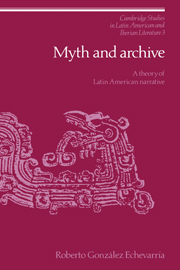Book contents
- Frontmatter
- Contents
- Preface
- Acknowledgments
- 1 A clearing in the jungle: from Santa Mónica to Macondo
- 2 The law of the letter: Garcilaso's Comentarios
- 3 A lost world re-discovered: Sarmiento's Facundo and E. da Cunha's Os Sertões
- 4 The novel as myth and archive: ruins and relics of Tlön
- Notes
- Bibliography
- Index
2 - The law of the letter: Garcilaso's Comentarios
Published online by Cambridge University Press: 12 September 2009
- Frontmatter
- Contents
- Preface
- Acknowledgments
- 1 A clearing in the jungle: from Santa Mónica to Macondo
- 2 The law of the letter: Garcilaso's Comentarios
- 3 A lost world re-discovered: Sarmiento's Facundo and E. da Cunha's Os Sertões
- 4 The novel as myth and archive: ruins and relics of Tlön
- Notes
- Bibliography
- Index
Summary
It's a nice thing for you to try and persuade me
that all these fine books say is nonsense and lies,
when they are printed by license of the Lords of
the Royal Council – as if they were people who
would allow a pack of lies to be published…
Miguel de Cervantes, Don Quijote, I, 32No event prior to it, and few since, has been written about as much as the discovery and conquest of America. It is commonplace to say that America was “discovered” by the printing press that made the news available to many throughout the Western World. Columbus' letter to Luis de Santángel, written in February of 1493, was quickly printed and distributed in Latin translation as well as in versions in vernacular languages. Soon, by 1500, Peter Martyr d'Anghiera had written his first set of “decades,” which already attempted to incorporate Columbus' deed into history. Other distinguished historians, with or without the official approval of the Spanish Crown, set out to write the history of America: Gonzalo Fernández de Oviedo, Francisco López de Gómara, Bartolomé de las Casas, Francisco de Herrera y Tordesillas, José de Acosta, are among many others. Writing the history of America, of course, was no ordinary task. The discovery and conquest pushed these historians' skills and received ideas to the limit. How could this new story be told in a language burdened by old stories? How did this event affect the idea of history held until then?
- Type
- Chapter
- Information
- Myth and ArchiveA Theory of Latin American Narrative, pp. 43 - 92Publisher: Cambridge University PressPrint publication year: 1990
- 1
- Cited by



